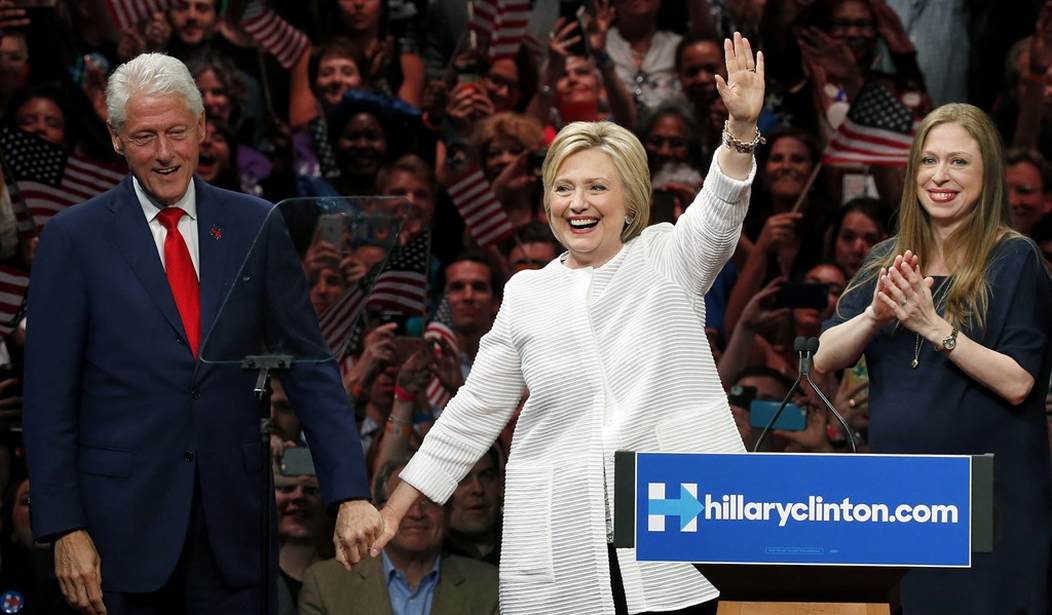Many leaders of big business support Hillary Clinton. Last week she announced a list of 56 corporate backers. No wonder Bernie Sanders is still running against her.
Hillary Clinton always has attracted well-connected business supporters. Even before she ran for office. Remember the lucrative cattle trades when she was Arkansas first lady? That came from a local businessman who knew how important it was to have friends in the governor’s mansion.
Bill Clinton had plenty of business support when he ran for president. As New York senator she was quite friendly with Wall Street—a relationship that continued afterwards, with her being paid queenly sums for talks which probably did not emphasize how she was fighting for the common man and woman. While secretary of state corporate behemoths were generous with donations to her family foundation.
Now big business is coming out for her in the presidential race. Admittedly, not all are traditional firms. Magic Johnson, the former basketball player, made the list as Chairman and CEO, Magic Johnson Enterprises. So did Erroll Davis, retired chancellor of the University System of Georgia. State colleges are more politics than business.
What stands out among the companies are the names of those whose business depends on government regulation or largesse. It’s impossible to know what Donald Trump would do in such cases. But we do know what Hillary Clinton would do: Keep the corporate welfare flowing.
Recommended
For instance, there’s Dan Akerson, former chairman and CEO of Government Motors, er, I mean General Motors. Richard Anderson, Executive Chairman of Delta Airlines, which is at the mercy of government policy at almost every point in its operations. James Bell, former corporate president and CFO of Boeing. Indeed, in the recent battle over the Export-Import Bank, long known as Boeing’s Bank, Hillary Clinton, in contrast to most of the GOP presidential contenders, stood fast for corporate profit at taxpayer expense.
There’s Robert Burt, former chairman of the Business Roundtable, which has been a steadfast supporter of corporate welfare. And Margot Dorfman, President and CEO of the U.S. Women’s Chamber of Commerce. Her group wants lots of government programs.
Another name on the list is James J. Murren, Chairman and CEO of MGM Resorts International. It’s hard to get more political than the gambling industry. Can you say support for stadium subsidies and antitrust exemption? Gary Rodkin, the retired CEO of ConAgra Foods. There are farm subsidies aplenty.
Of course, all of these executives may be backing Hillary Clinton because they believe she is most likely to bring peace to the Middle East, deter Chinese expansion, and contend with Brexit. Still, surely they, like Sen. Sanders, are aware that Clinton always has been a soft touch when it comes to well-heeled businessmen and women.
Earlier this year Michael Bloomberg bluntly declared: “The Republican Party is no longer the party of business.” He complained that the GOP was appealing to … union members. For instance, while business leaders supported federalizing education through the Common Core, Republicans opposed it: “Some crazy right wing people claimed it was a federal program.”
I guess we can argue whether it’s more regulation or “program,” as if that matters. It certainly is control. Which is why conservatives oppose it.
We see much the same phenomenon with religious liberty. Corporate behemoths are lining up with government, ready to crush small enterprises underfoot if they do not genuflect before the idol of social liberalism.
Big business long ago made its peace with the regulatory Leviathan. Indeed, regulation is a competitive advantage for large firms. The losers are small enterprises: the proverbial “little guy,” like the wedding photographer, baker, and event site. The big companies don’t much care who gets run over by history so long as they are friends of the driver—in this case Hillary Clinton.
Of course Republican candidates should seek support from corporate executives just like anyone else. Many do believe in limited government and individual liberty. And the GOP should be pro- free market, with regulation focused on ensuring a fair process. The objective should not be pro- business per se.
Similarly, the party should be in favor of free bargaining between labor and management over wages and working conditions. And ensuring that the rules are fair to all. That means being friends of working people, not Big Unions.
Alas, economic privilege, not fairness, always has been Hillary Clinton’s agenda. Which is why some corporate executives are joining her campaign.

























Join the conversation as a VIP Member